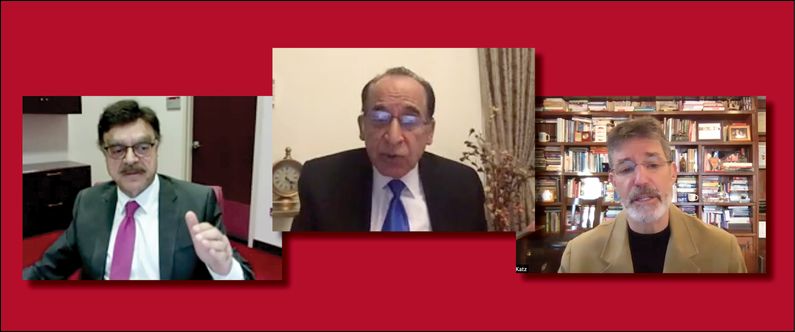WCM-Q launches new webinar series to drive population health and wellness efforts in Qatar
 From left: Dr. Javaid Sheikh, Dr. Ravinder Mamtani and Dr. David L. Katz.
From left: Dr. Javaid Sheikh, Dr. Ravinder Mamtani and Dr. David L. Katz.
The Institute for Population Health (IPH) at Weill Cornell Medicine-Qatar (WCM-Q) has launched a new series of webinars to explore how evidence-based integrative and preventive approaches can promote health and help tackle major global health challenges
The Population Health and Well-being webinar series features a different expert speaker each month discussing the major health challenges facing populations across the world, such as the obesity and type 2 diabetes epidemic, infectious disease pandemics, the rising rate of mental illness, health inequity, healthcare system design, and gaps in healthcare professionals’ education and training, among many others. Underlying the series is a guiding theme that a wide range of behavioral, societal and environmental factors negatively impact the health of populations, and that integrating lifestyle-based, preventive approaches into conventional healthcare systems is key to improving health and well-being for all.
The webinar series is the creation of the IPH, led by Dr. Ravinder Mamtani, Vice Dean for Student Affairs-Admissions, Population Health, and Lifestyle Medicine; Dr. Sohaila Cheema, Assistant Dean for the Institute for Population Health; and Dr. Sathyanarayanan Doraiswamy, Assistant Director for the Institute for Population Health.
The series began with a live webinar delivered by Dr. Javaid I. Sheikh, Dean of WCM-Q and Professor of Psychiatry and Population Health Sciences, entitled Life in Transition: Thriving during the pandemic and beyond. In the webinar, Dr. Sheikh emphasized the importance of building resilience, social connectedness, self-care (both emotional and physical), and maintaining a sense of purpose during the unprecedented circumstances presented by the pandemic. He also gave practical examples of ways to learn and enhance personal resilience, deal with stress and take care of one’s emotional and physical well-being through regular exercise, sufficient sleep, following a healthy diet and using meditation, prayer and relaxation techniques.
The next webinar in the series was presented by Dr. Mamtani and was entitled Energizing lifestyle medicine in challenging times. Dr. Mamtani explained how lifestyle medicine approaches can continue to be effective at preventing and treating disease even in times of upheaval. Dr. Mamtani presented research which showed that the interruption of healthy habits caused by pandemics can lead to reduced physical activity, poor food choices and indulgence in substance abuse, all of which make non-communicable diseases such diabetes, hypertension, heart disease, cancer, obesity and depression more likely. To combat this, Dr. Mamtani recommended purposeful adoption of lifestyle medicine approaches by individuals, focused on eating a well-balanced diet, taking 30 minutes of moderate intensity exercise each day, fostering stable and healthy social relationships, developing strategies to manage stress, avoiding risky substances like tobacco and alcohol, and getting plenty of sleep.
That webinar was followed by the next in the series, given by Dr. David L. Katz, Founder and President of the True Health Initiative and Past President of the American College of Lifestyle Medicine, who spoke about using harm minimization strategies to protect the most vulnerable from both the direct harms of COVID-19 and indirect harms presented by social and economic disruption.
Dr. Cheema said: “This new series of webinars presents us with a very exciting new forum within which to conceptualize new approaches to protecting and enhancing the health of all people. We firmly believe that to truly address the gravest health challenges facing us today we need to move beyond the traditional curative paradigm and embrace preventive approaches to healthcare, understood within the context of the wider society and our environment. This series provides a space in which leading experts from a wide variety of fields can share their knowledge across intersectoral boundaries and conceive new ways to enhance health for all, in a sustainable and equitable fashion.”
To learn more about the Population Health and Well-being Series of the Institute for Population Health, visit: https://qatar-weill.cornell.edu/institute-for-population-health/population-health-well-being-series